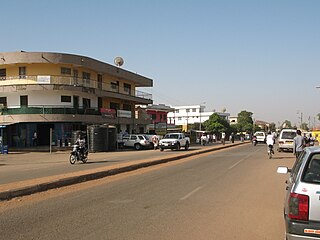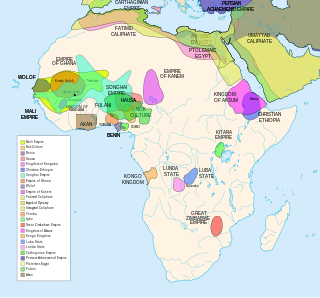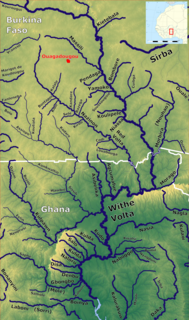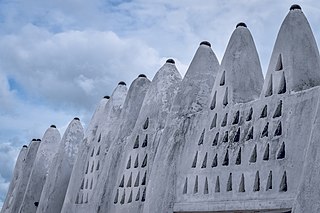The Dagaaba people are an ethnic group located north of the convergence of Ghana, Burkina Faso and Côte d'Ivoire. They speak the Dagaare language, a Gur language made up of the related Northern Dagaare dialects, Southern Dagaare dialects and a number of sub dialects. In northern dialects, both the language and the people are referred to as Dagara. They are related to the Birifor people and the Dagaare Diola. The language is collectively known as Dagaare, and historically some non-natives have taken this as the name of the people. One historian, describing the former usage of "Dagarti" to refer to this community by colonials, writes: "The name 'Dagarti' appears to have been coined by the first Europeans to visit the region, from the vernacular root dagaa. Correctly 'Dagari' is the name of the language, 'Dagaaba' or 'Dagara' that of the people, and 'Dagaw' or 'Dagawie' that of the land."
Wala may refer to:

Wa is a town and the capital of Wa Municipal District and the Upper West Region of northern Ghana. Wa had a 2012 settlement population of 102,446. Features of the town include several churches and mosques, the Wa-Na Palace, the St. Andrew's Catholic cathedral, the University for Development Studies (UDS), a museum, a nearby hippopotamus sanctuary in Wicheau, the mushroom rock In Jirapa and the ants hill at Nanvielle. The geography of Wa is notable for the dramatic monadnock Ombo Mountain, which is located around Kaleo and visible from much of the Wa town. Other notable towns around Wa region include Naaha and Ga.
The Wala or Waala live in Upper West Region of Ghana. They are a predominantly Muslim people who are the founders of the city of Wa and the Kingdom of Wala. They speak the Wali language, which belongs to the Gur group. There are 84,800 speakers of the language as of 2013. Their neighbors are the Birifor, Dagaaba, and Vagla peoples.
Professor Emeritus Ivor G. Wilks was a noted British Africanist and historian, specializing in Ghana. Considered one of the founders of modern African historiography, he was an authority on the Ashanti Empire in Ghana and the Welsh working-class movement in the 19th century. At the time of his death, he was Professor Emeritus of History at Northwestern University in Illinois, USA.

African empires is an umbrella term used in African studies to refer to a number of pre-colonial African kingdoms in Africa with multinational structures incorporating various populations and polities into a single entity, usually through conquest.
Wali is a Gur language of Ghana that is spoken mainly in and nearby the town of Wa Upper West Region, Ghana.

Funsi is a small town and is the capital of Wa East district, a district in the Upper West Region of north Ghana.

The Kulpawn River is one of the major rivers of northwestern Ghana, along with the Black Volta and Sisili Rivers. It flows through Wa Municipal District. The riparian woodland around the bank of the Kulpawn in the Wahabu is particularly popular with ornithologists, due to a rich variety of birds.

Ahmadiyya is an Islam branch in Ghana, under the spiritual leadership of the caliph in London. The early rise of the Community in Ghana can be traced through a sequence of events beginning roughly at the same time as the establishment of the worldwide Community in 1889 in British India. It was during the early period of the Second Caliphate that the first missionary, Abdul Rahim Nayyar was sent to what was then the Gold Coast in 1921 upon invitation from Muslims in Saltpond. Having established the Ahmadiyya movement in the country, Nayyar left and was replaced by the first permanent missionary, Al Hajj Fadl-ul-Rahman Hakim in 1922.
Babatu or Baba Ato, was the Djerma military leader and jihadi warlord over the Zabarma Emirate in the late 19th century. Babatu originated in Indougou (N'Dougou) in what is today the nation of Niger. Babatu became the ruler of the Zabarima emirate in 1878 after the death of the former ruler, Gazari. He was a slaver and fought against Sandema warriors.
Nasa is a village in Ghana in the historic Kingdom of Wala in the current Upper West Region of Ghana. It is 14 miles northeast of Wa, Ghana.
Kulmasa is a town in the Sawla-Tuna-Kalba District, Savannah Region, Ghana. In the 1890s, it marked the southern frontier of the Kingdom of Wala.
The Wala Native Authority was a division of the British colony of Gold Coast established in 1933. It basically corresponded in its boundaries to those of the Kingdom of Wala in 1892, thus reversing the successful rebellion by the Dagarti in the northern part of Wala in 1894.

Al-Hajj Abdul Rahim Nayyar was a companion of Mirza Ghulam Ahmad and a missionary of the Ahmadiyya Islamic movement in West Africa. He pledged allegiance to Ghulam Ahmad, formally joining the Ahmadiyya movement, in 1901. Travelling to the Gold Coast in 1921 upon invitation from Muslims in Saltpond, Nayyar was instrumental in consolidating Ahmadiyya missions in several West African countries.
Jatoe Kaleo (1928–1998) was a Ghanaian traditional ruler, politician and founding member of the Northern Peoples Party.
Bukari Kpegla Adama was a Ghanaian politician and a minister of state in the Second Republic.
Mumuni Adams was a Ghanaian politician. He was the member of parliament for the Wala constituency from 1965 to 1966.

Wa Naa's Palace is the home to the King of the Wala people who are said to be the majority in Wa in the Upper West Region of Ghana. It is located in the heart of the town and the home to the entire family, palace staff and officials of the kingdom. It is the place for cultural, political, religious and social importance for the local people. In the palace, the chief sits on either a skin of a lion or antelope where as others sit on the skin of a cow or sheep.
Dumba Festival is an annual festival celebrated by the chiefs and people of Wa of the Wala Paramouncy in the Upper West Region of Ghana. It is usually celebrated in the month of September or October.